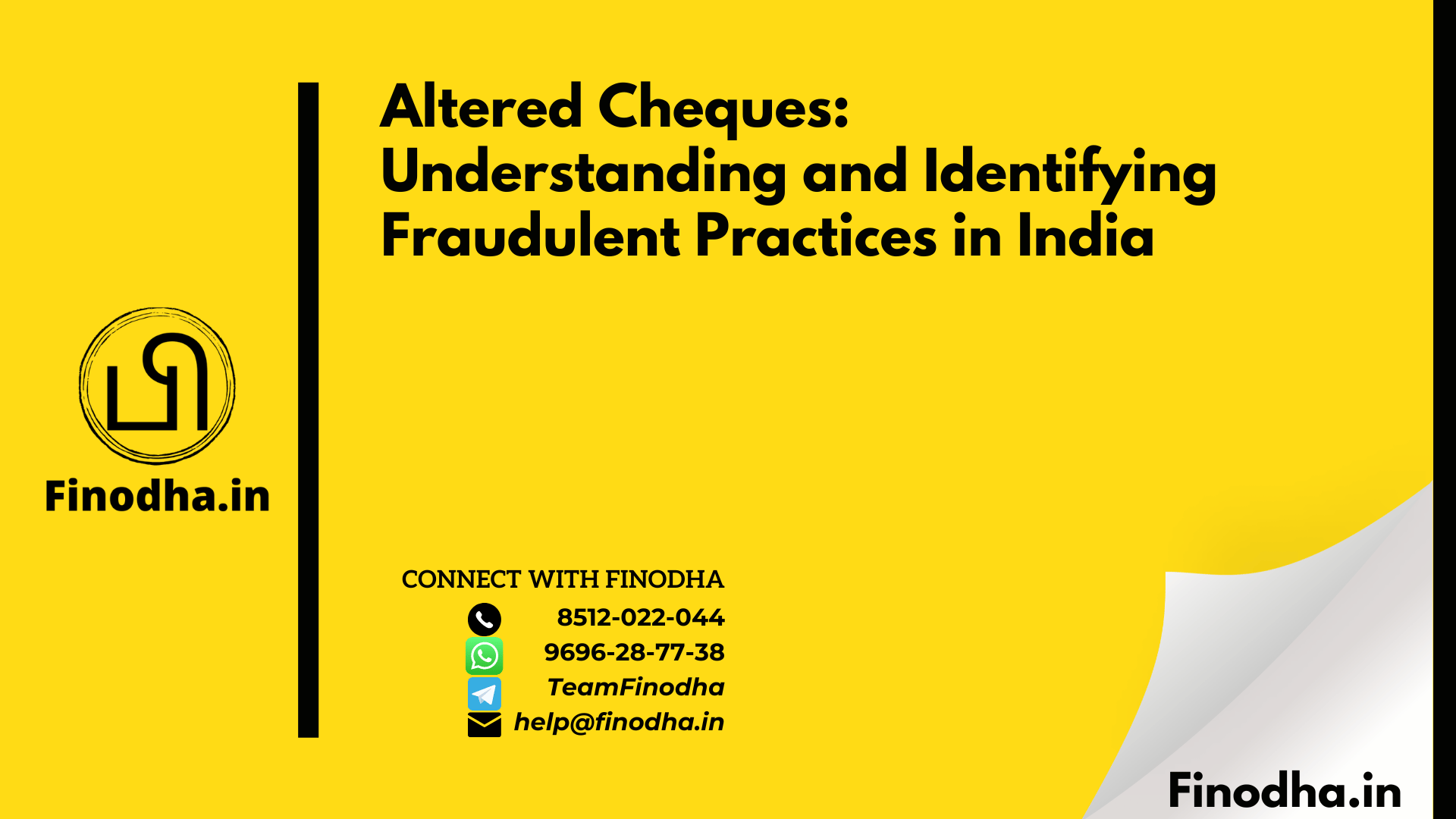Important Keywords: Altered cheques, Cheque fraud, Identifying altered cheques, Punishment for altered cheques in India, Liability and responsibility, Dishonour of cheques, Negotiable Instruments Act, Cheque bounce, Detecting fraudulent cheques.
Introduction
Protect Yourself: Understanding Altered Cheques and How to Spot Fraud
Headings:
- What are Altered Cheques?
- Types of Cheque Fraud
- Tips to Identify Altered Cheques
- Punishment for Altered Cheques in India
- Liability and Responsibility
- Example
- Key Takeaways
- Conclusion
Sub-headings:
1.1 The Basics of Altered Cheques
2.1 Different Types of Cheque Fraud
3.1 Helpful Tips to Identify Altered Cheques
4.1 Legal Consequences for Altered Cheques in India
5.1 Determining Liability and Responsibility
6.1 An Illustrative Example
7.1 Key Points to Remember
8.1 Final Thoughts on Altered Cheques
Short Paragraphs:
Altered cheques are a form of fraud where changes are made to the payee name, cheque amount, or date, with the intention of committing a material and malicious act. It is important to be aware of altered cheques as they are one of the most common types of cheque fraud in India. Fraudulent practices can include forging signatures, falsifying cheques, and creating remote cheques without proper authorization. Altering the amount on a cheque is often easier than changing the payee name.
To identify altered cheques, it is crucial to pay attention to inconsistent handwriting, visible signs of alteration or erasure, and encourage customers to report stolen cheques immediately. Advising customers not to leave blank spaces while writing a cheque and ensuring that any alterations are properly verified by the signature of the payee or drawer can also help in detecting fraudulent activity.
In India, dishonour of cheques, commonly known as cheque bounce, is considered a criminal offence under Section 138 of the Negotiable Instruments Act, 1881. The punishment for this offence can include imprisonment for up to one year, a fine double the amount of the dishonoured cheque, or both.
Liability for an altered cheque can vary depending on the circumstances. The responsibility may lie with the cheque issuer, the cheque drawing bank, or the cheque presenting bank. It is crucial for the cheque issuer to ensure that there are no significant blank spaces left while writing the amount and quantity lines to prevent alterations.
Example:
Let’s consider a scenario where a person receives a cheque from someone they trust, only to later discover that the cheque amount has been altered from Rs 1,000 to Rs 1,00,000. In such cases, it is essential to contact the bank immediately and report the fraudulent activity. By promptly notifying the bank, the chances of recovering the funds and holding the responsible parties accountable increase significantly.
Key Takeaways:
- Altered cheques involve malicious changes to the payee name, cheque amount, or date.
- Inconsistent handwriting and visible signs of alteration can indicate fraudulent activity.
- Reporting stolen cheques promptly and avoiding blank spaces when writing cheques can help prevent alterations.
- Dishonour of cheques is a criminal offence in India under Section 138 of the Negotiable Instruments Act.
- Liability for altered cheques can be shared by the cheque issuer, the drawing bank, or the presenting bank.
- Vigilance and prompt action are crucial for identifying and preventing cheque fraud.
Conclusion:
Understanding altered cheques and being vigilant about identifying fraudulent practices is essential in safeguarding financial transactions. By following the provided tips and promptly reporting any suspicious activity, individuals can protect themselves from falling victim to altered cheque fraud. Additionally, knowing the legal consequences and liability associated with altered cheques empowers individuals to take appropriate action to mitigate risks and maintain the integrity of the financial system.
Capital gains (21) CGST (277) Chapter VI-A (15) e-Compliance Portal (21) E-Verify (20) economic growth (21) F&O Trading (29) F.No.354/117/2017-TRU (23) F. No. CBIC-20001/4/2024-GST (15) Financial planning (15) financial stability (17) GST (1424) IGST (222) Income from House Property (17) Income Heads (16) Income Source (14) Income tax (111) Income Tax Account (15) Income Tax Filing (20) Indian context (22) Indian investors (16) ITR-3 (19) ITR Form (20) P&L Statement (24) PAN (13) Risk Management (20) Salary Income (19) Section 7(1) UTGST Act 2017 (14) Section 8(1) UTGST Act 2017 (26) section 9 (18) section 10 (28) section 15 (13) section 25 (17) section 39 (24) section 49 (16) section 50 (16) section 51 (13) Section 52 (16) Section 54 (13) section 73 (20) section 74 (21) SGST (223) Speculative Income (14) Trading Income (33) UTGST (78)







